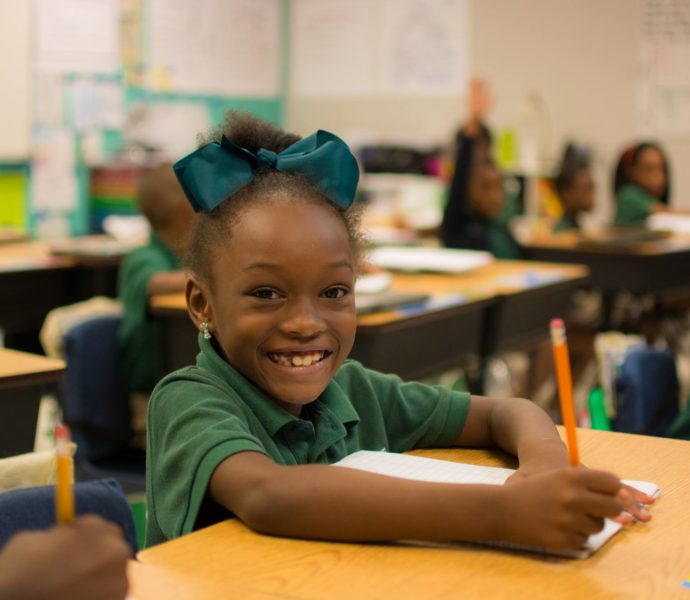Editorial: KIPP schools symbolize hope for so many
ByTimes-Union Editorial Board
Read the full article at Jacksonville.com >
When you’re driving north on McDuff Avenue, you will pass through a neighborhood that looks a bit worn.
Then in the distance, you see it.
It is the huge building that is the home of the KIPP Jacksonville schools.
It represents a symbol of hope in this Northwest Jacksonville neighborhood.
The proof is that there are more than 1,000 people on a waiting list to have their children attend one of the three schools run by KIPP (two elementary schools and a middle school).
The facilities look brand new.
There is little sign of the dog track that once stood at that site — in fact, the dog track has been transformed into the school’s running track.
STRONG EDUCATORS, MILITARY PASTS
When you walk through the school, you will see college pennants everywhere.
This is a part of the KIPP culture, a nationwide network of schools built on a “work hard, be nice” model.
The KIPP school is neither a private nor for-profit one.
It’s a charter school run by a nonprofit.
As a charter school, that means it’s a public school. Students are accepted to the school by lottery.
They are predominantly low-income, African-American students from north and west of the St. Johns River.
Tom Majdanics led the school in its early years, but he has now turned over leadership of KIPP to two people with outstanding resumes.
Executive Director Jennifer Brown runs the academic side of the operation.
Zach Rossley, the president and chief operating officer, handles everything else.
Both have had distinguished careers in education after first serving in the military.
Brown’s father was a career Army serviceman. She enlisted herself three weeks before the September 2001 terrorist attacks and later spent two years in the Green Zone in Iraq.
Rossley is a graduate of West Point who served five years in the military. He went on to earn an MBA from Harvard, but eventually realized he wanted to get involved in the school reform movement. Rossley also had a link to our city: He lived in this area while his father served in the Navy at NAS Jacksonville.
The military often hones an individual’s desire to truly make a difference. And both Rossley and Brown have brought that attitude to their work at KIPP, along with a deep sense of commitment.
Indeed, Brown is so invested in KIPP — and so comfortable with its direction and philosophy — that her daughter is a second-grader at the school.
STRONG COLLEGE CULTURE
The strong college culture found in the KIPP Jacksonville schools is the same one that exists in many of the city’s leading college prep schools.
Every KIPP student is expected to play an instrument starting in the fourth grade — these days, the middle school’s bands regularly receive honors for excellence.
The KIPP culture is focused on college.
It’s like living in a college town.
Every class visits a college every year.
Meanwhile, KIPP administrators and teachers follow and support graduates through the high school and college years.
Most KIPP students are first-generation college students, so the students get the same kind of information, direction and support that college-educated parents routinely give to their children.
STUDENTS WITH DAUNTING CHALLENGES
Many of the children attending KIPP come from high-poverty neighborhoods with traumas and hurdles to overcome.
Not long ago, The Florida Times-Union reported on a young mother shot in the leg by an ex-boyfriend, while a 3-year-old was shot in the head.
A KIPP kindergartner, the 3-year-old’s brother, had witnessed the violence.
KIPP has school counselors, but they may not be equipped to deal with such potentially horrific situations.
Thanks to philanthropy, mental health therapists from the Children’s Home Society are embedded in KIPP.
Meanwhile, KIPP teachers go through professional development to help them observe behavior that could indicate that a student is grappling with trauma or crisis outside the classroom.
But KIPP takes the extra step in its relationship with students. Every student gets a home visit during the summer from teachers so instructors can fully learn about the child’s family life.
Brown said that while a teacher may be tempted to harp on why a student didn’t do his homework, the reality may be that child “didn’t know where he would be sleeping last night.”
PLANS TO EXPAND AND GROW
Local plans include adding another middle school and a high school — and to eventually have some 2,000 students on campus.
KIPP has finalized its first college partnership with Florida State College at Jacksonville — and there are more college collaborations to come.
Currently, there is no other KIPP school in Florida.
But school day after school day, school year after school year, Jacksonville has many reasons to be proud that it can make this statement:
KIPP is here.
And it is making a difference here.
